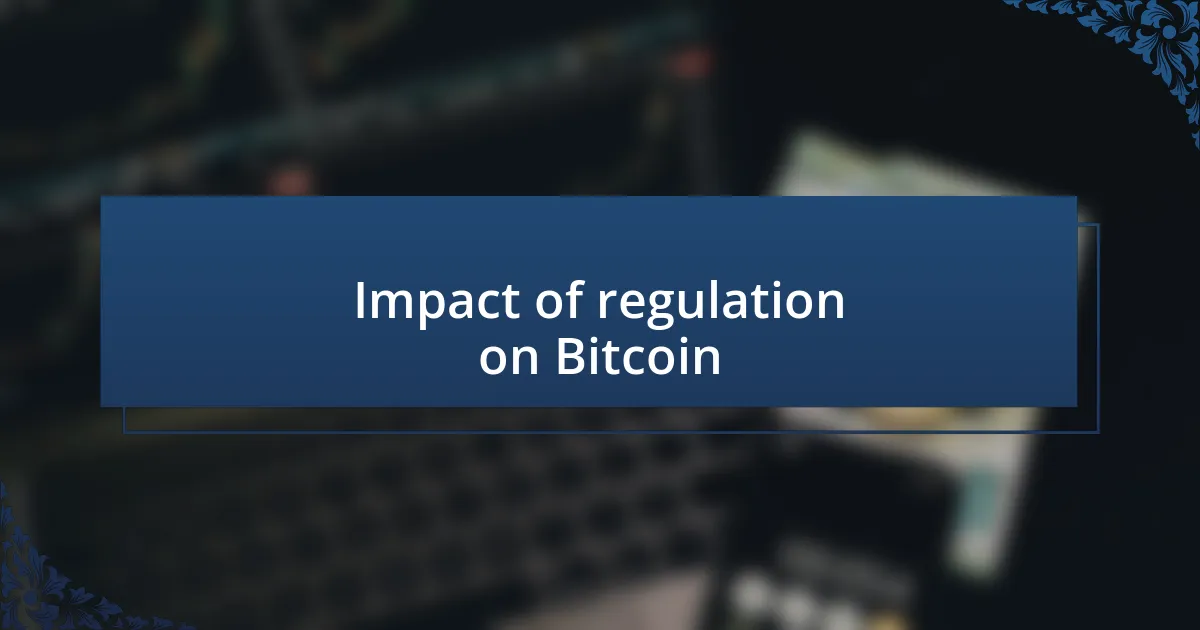Key takeaways:
- Bitcoin failures often stem from speculative trading, poor user experience, and misinformation, leading to unrealistic expectations and poor investment decisions.
- Adaptability, thorough research, and community support are crucial for navigating Bitcoin’s volatility and market challenges.
- Regulatory clarity is increasingly important for fostering trust and institutional investment in Bitcoin, enhancing its resilience.
- Lessons from Bitcoin’s challenges apply to other cryptocurrencies, emphasizing the need for robust technology, transparency, and adaptability in the market.

Understanding Bitcoin failures
Bitcoin failures can often be attributed to a lack of regulation and volatility in the market. I remember my initial investment; the excitement was palpable. However, witnessing the price drop dramatically left me questioning my judgment. Did I truly understand what I was getting into?
The exchange hacks and market collapses also highlight systemic vulnerabilities. When I first heard news of an exchange being compromised, it was a stark reminder of how fragile trust in digital currencies can be. Can we always rely on security measures when so much is at stake?
Moreover, the hype surrounding Bitcoin often overshadows the realities of its challenges. I recall friends urging me to join the bandwagon, insisting bitcoin would make us rich overnight. But as I unraveled its complexities, I wondered: is the promise of wealth worth the risks involved? Understanding these failures has been a crucial part of my journey with Bitcoin, reinforcing the need for caution and due diligence.

Common reasons for Bitcoin failures
While exploring the common reasons behind Bitcoin failures, I’ve recognized that one significant factor is the overexposure to speculative trading. I recall the frenetic energy in the air during major price surges; it was infectious. However, many traders, including myself at one point, entered the market convinced they could outsmart the trends, only to face steep losses when the hype fizzled. This volatile atmosphere can set unrealistic expectations, leading many to treat Bitcoin like a lottery ticket rather than a long-term investment.
Another common pitfall is the lingering issues with user experience and accessibility. I remember trying to navigate my first Bitcoin wallet; the plethora of options left me feeling overwhelmed. Complications often deter new users from making transactions, which can be discouraging. If the technology isn’t user-friendly, potential investors may simply give up before they even start, ultimately contributing to market failures.
Lastly, the influence of misinformation can’t be overlooked. In my early days of investing, I came across numerous blogs and forums promising unparalleled insights. Unfortunately, not all sources were credible. It was like navigating a maze blindfolded; misinformation created confusion and led to poor investment decisions. When the market relies on a foundation of rumors and misconceptions, it’s no wonder that failures occur with alarming frequency.
| Reason for Failure | Description |
|---|---|
| Speculative Trading | Overexposure to trading often leads to unrealistic expectations and steep losses. |
| User Experience | Poor accessibility and complicated interfaces deter new users from engaging with Bitcoin. |
| Misinformation | Credibility issues in sources of information create confusion and poor investment decisions. |

Lessons learned from major failures
While reflecting on the major failures that have impacted the Bitcoin landscape, I’ve realized that adaptability is crucial. I recall a time when the market was facing a severe downturn, and many were clinging to their investments out of fear rather than assessing the situation. This taught me that flexibility in strategy is vital; holding onto a failing asset without a plan can lead to unnecessary losses.
Here are some key lessons gleaned from major failures:
- Embrace Change: Markets evolve rapidly. If you’re not willing to adjust your approach when things change, you’re setting yourself up for failure.
- Prioritize Research: In my early days, I often acted on impulses rather than thorough research. A disciplined approach can save both money and stress.
- Understand Market Psychology: Recognizing how emotions influence trading decisions can prevent impulsive actions. I learned to take a step back during periods of market frenzy.
I’ve also seen firsthand how important community support can be. During a severe market crash, I found solace in discussions with fellow investors who felt similarly impacted. This experience highlighted the value of surrounding oneself with knowledgeable, trustworthy individuals. Being part of a community can provide guidance and reassurance, which is often critical during turbulent times.

Impact of regulation on Bitcoin
Regulation in the Bitcoin space has often felt like a double-edged sword to me. On one hand, it can create a sense of legitimacy and trust which I personally appreciate, especially when I think back to the wild early days of cryptocurrency trading. I remember a time when regulatory news sent prices soaring or crashing, and it made me wonder – how much of my investment strategy should hinge on these external factors?
As I navigated through different exchanges, I noticed that regulatory changes affected not only my trading options but also the overall market stability. When countries like China imposed bans, it was disheartening to see how quickly sentiments turned. I often asked myself, should we be more resilient in the face of such policies, or should regulation shape how we invest in the future?
Reflecting on how regulation can cultivate innovation, I feel torn. While it can stifle some smaller, independent projects, it also fosters an environment where larger entities can’t ignore Bitcoin anymore. I’ve seen how some startups benefited from clearer guidelines, leading to legitimate use cases that not only fueled my interest but also reassured fellow investors. Isn’t it fascinating how the same rules can both inhibit and promote growth in such a dynamic field?

Strategies for successful Bitcoin investments
Investing in Bitcoin requires a carefully considered strategy. From my experience, diversifying your investment is crucial. I remember when I allocated a portion of my portfolio to not just Bitcoin but also other cryptocurrencies and blockchain projects. This decision, despite initial hesitation, helped cushion me when Bitcoin experienced volatility. Isn’t it interesting how spreading risk can often lead to more stable returns?
Another strategy that has served me well is dollar-cost averaging (DCA). By investing a fixed amount regularly, regardless of price fluctuations, I found a way to relieve the anxiety of timing the market. I once took part in a DCA plan when Bitcoin was hovering around a particularly high price point. Initially worried about overpaying, I later realized that those consistent, smaller purchases allowed me to ride out the market’s ups and downs with much less stress. Have you considered how a systematic approach to investment might change your overall experience?
Additionally, staying informed about market trends and technological advancements is vital. I’ve seen individuals who neglect this aspect often find themselves out of the loop, missing out on promising developments or important policy changes. For instance, when I followed the updates related to Bitcoin’s scalability solutions, I felt more equipped to anticipate potential price movements. Engaging actively with the community can be just as enriching; has checking in with fellow investors ever led you to new insights or strategies?

Future outlook for Bitcoin resilience
Bitcoin has shown remarkable resilience after facing numerous setbacks, and I believe this trend will likely continue in the future. I recall the market crash in 2018 when many were ready to abandon ship. Yet, those who stood firm found themselves managing a comeback that was not only impressive but also educational. How many times have we underestimated the power of community and innovation in reviving a once-ailing asset?
Looking ahead, regulatory clarity is becoming a pivotal factor in Bitcoin’s strength. From my observations, as more governments establish clearer policies around cryptocurrency, it fosters trust and institutional investment. There’s something empowering about knowing that a regulatory framework is being built; it makes me feel more optimistic about Bitcoin’s role in the wider financial ecosystem. Have you noticed how increased legitimacy can shift the narrative around an asset?
In addition, the ongoing advancements in Bitcoin’s technology enhance its appeal. I remember feeling a surge of excitement when Lightning Network gained traction, making transactions faster and cheaper. This reminds me that innovation is perpetual, and it’s exciting to think about how future developments could redefine Bitcoin’s use case. Have you ever considered how each upgrade or improvement adds another layer of resilience to this system?

Applying lessons to other cryptocurrencies
Analyzing Bitcoin failures provides invaluable lessons that can be directly applied to other cryptocurrencies. For instance, I remember when I first invested in Ethereum and saw it skyrocket, but then it faced significant scalability issues. This experience taught me that while hype is enticing, the technology behind an asset must be robust enough to handle real-world demand. Have you ever thought about how critical it is for crypto projects to address these fundamental issues early on?
In my journey through the crypto landscape, I’ve noted that transparency is crucial. After observing how some projects stumbled due to lack of communication with their communities, I started prioritizing projects that maintain open dialogues. This has reinforced my belief that fostering trust not only aids in navigating failures but also in building a stronger foundation for future developments. How can we not appreciate the importance of being transparent in a space that thrives on communal trust?
Moreover, I find that adaptability is a key theme. Remember the tumultuous times for Bitcoin when forks became a hot topic? I learned that the ability to pivot and embrace change can either make or break a cryptocurrency. This lesson feels especially relevant today as newer coins strive to differentiate themselves. What are your thoughts on how adaptability can shape the future of these digital assets in an ever-evolving market?






